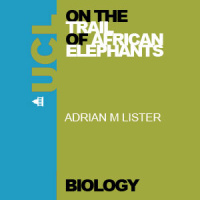Synopsis
The BBC Natural History Unit produces a wide range of programmes that aim to immerse a listener in the wonder, surprise and importance that nature has to offer.
Episodes
-
Saving Species - 20 Nov 12: Ash die back/Managing Woodlands
21/11/2012 Duration: 28minEp 12 of 24: Plant a tree in 73" became a national slogan and very large numbers of trees have been planted over the decades since. Ash die back has been widely reported in many programmes, especially news, in recent weeks and in this programme we ask whether the call to plant trees and desire to create new woodlands has in any way contributed to this fungal attack on Ash trees. We also ask how serious a threat diseases are to our trees. Also in the programme - News from around the world with our regular news reporter, Kelvin Boot. And we'll update you on the activities of the Open University's iSpot. Presenter: Brett Westwood Producer: Mary Colwell
-
Living World 18 Nov 12 - Centipedes and millipedes
18/11/2012 Duration: 21minAlongside Myriapod expert Steve Gregory, Living World is in Oxfordshire on the search for for centipedes and millipedes. Presented by Chris Sperring/Produced by Andrew Dawes.
-
IPOR 16 Nov 12: 5/5 The Purple Emperor
16/11/2012 Duration: 13minIn Pursuit of the Ridiculous: Ep 5/5 - The Purple Emperor Matthew Oates is a complete fan of the rare purple emperor butterfly but meets his match in Neil Hume, a self-confessed addict of this insectsand its favoured woods. Produced by Brett Westwood
-
IPOR 15 Nov 12: 4/5 Slugs and Snails
15/11/2012 Duration: 13minIn Pursuit of the Ridiculous: 4/5 - Slugs and Snails After enduring a wet slug-filled summer Matthew Oates meets Mary Seddon, a biologist specialising in slugs and snails to find out why she finds the study of molluscs so compelling. Produced by Brett Westwood
-
IPOR 14 Nov 12: 3/5 Rare Orchids
14/11/2012 Duration: 13minIn Pursuit of the Ridiculous: Ep 3/5 - Rare Orchids Most natural historians look for species, but today Matthew Oates meets botanists enthusing over some spectacular hybrid orchids with very rare parents. Produced by Brett Westwood
-
IPOR 13 Nov 12: 2/5 Twitching
14/11/2012 Duration: 13minIn Pursuit of the Ridiculous: Ep 2/5 - Twitching To outsiders, twitching can seem the most pointless of natural history activities. Matthew Oates meets Rob Lambert from the University of Nottingham to find out why he twitches. Produced by Brett Westwood.
-
IPOR 12 Nov 12 : 1/5 Water Beetle
14/11/2012 Duration: 13minIn Pursuit of the Ridiculous - Ep 1/5: Water Beetle In the first of five programmes about naturalists and their pursuits, Matthew Oates goes hunting with Andy Foster, man obsessed for thirty years by a rare water-beetle. Produced by Brett Westwood.
-
Saving Species - 13 Nov 12: Goliath Grouper/Asiatic Lion/Waxwings
14/11/2012 Duration: 27minReporter Mark Brazil travels to the Gir Forest National Park in India to report on the plight of the last lions in Asia. A sanctuary set up in 1972 and now holds about 400 individuals. The Atlantic Goliath Grouper is a huge, majestic fish only found in significant numbers today off the coast of Florida. At up to 2.5m in lenght, they are outsized only by the few remaining sharks and they are critically endangered across their range due to historical overfishing. Helen Scales meets her first wild goliaths in the company of Dr Sarah Frias-Torres who is studying many aspects of these huge fish including a survey of scuba divers that she hopes will show that a goliath is worth more alive than dead. Paul Stancliffe brings the latest information on the invasion of Waxwings in the UK.
-
Living World 11 Nov 12 - The Harvestman's Garden
14/11/2012 Duration: 21minLiving World goes in search of autumn harvestmen in Yorkshire, a spider looking creepy crawly but as entomologist Paul Richards says, more closley related to a scorpion. Presented by Trai Anfield/Produced by Andrew Dawes.
-
Living World 04 Nov 12 - The Night Island
14/11/2012 Duration: 21minLiving World, presented by Chris Sperring, looks for the Manx Shearwater and Storm Petrel with ecologist David Boyle. To find them they go to Skomer Island after dark.
-
Saving Species - 06 Nov 12: Wildcats/Tooth Fungi
12/11/2012 Duration: 27minEp 10 of 24 Saving Species reporter Karen Partridge travels to Scotland to seek out the Scottish wildcat: an iconic emblem of the unspoilt wilderness of Scotland. It has been suggested that there may be fewer than one hundred pure bred wildcat in Scotland, with some studies concluding that this species may actually be rarer that the Amur tiger or even extinct as a genetic species. Professor Lynne Boddy from Cardiff University travels to the New Forest in search of a very rare fungus, the bearded tooth fungus (Hericium erinaceus). This species is commonly grown commercially however in the wild it is one of the rarest fungi's in the UK and it's importance in the woodland ecosystem as a wood-recycling fungus is giving conservationists cause for concern.
-
Saving Species - 30 Oct 12: Citizen Science/Giant Harvestman
30/10/2012 Duration: 27minCitzen Science/Giant Havestman Saving Species asks this week what contribution the amateur naturalist makes to our understanding of the natural world through citizen science.
-
Saving Species - 23 Oct 12: British Raptors
23/10/2012 Duration: 27minBrett Westwood discusses issues arising in our countryside from a rising bird of prey population and possible conflict this brings to other land users.
-
Saving Species (Srs 3) - 16 Oct 12 - Ep 7
17/10/2012 Duration: 27minEp 7 of 24 Brett Westwood talks to heads to filmmakers attending International Wildscreen Film Festival 2012 to discuss their work and motivations, Plus, Brett gets the latest on the multi-wildlife organisation conservation breading project to save the critically-endangered Spoon-billed Sandpiper bird. Presenter: Brett Westwood Producer: Sheena Duncan Exec Producer: Julian Hector
-
Saving Species (Srs 3) - 09 Oct 12 - Ep 6
09/10/2012 Duration: 27minIn this episode of Saving Species we look at one of Britain's favourite birds - the swallow. Ed Drewitt travels to a swallow roost in Southern England, where overnight he joins the The Wetland Trust to trap and ring swallows as they gather in a mass roost to head south. So how have the swallows and other summer migrants done this year? Chris Sperring travels with entomologist Tristan Bantock to a central London park to track down the rare mediterranean Southern Oak Bush Cricket was first recorded in the UK in 2001. Since then sightings of the bright green, wingless cricket have become more frequent, but still more elusive than its native counterpart. David Robinson from the Department of Environment, Earth and Ecosystems at the Open University joins Brett Westwood in the studio to discuss in more depth how the Southern Oak Bush Cricket came to be in the UK.
-
Saving Species (Srs 3) - 02 Oct 12 - Ep 5
02/10/2012 Duration: 27minIn this episode of Saving species we focus on the issues facing our rivers and freshwater systems. The Shropshire Wildlife Trust this year highlight them by saillling a curragh down the Severn. John Hughes from the Trust joins Brett Westwood on the water to give them a perfect otter's eye view of the issues facing our crowded countryside and ever increasing demands on this natural resource.
-
Saving Species (Srs 3) - 25 Sep 12 - Ep 4
25/09/2012 Duration: 27minCan the world's marine environments remain healthy and functioning under the influence of man, from pollution to over fishing and climate change? In Saving Species this week, Brett Westwood looks in depth at some of the issues and research being carried out into the species which depend upon this often abused natural resource. Our reporter Helen Scales travels to the Gambia, where issues of oyster overfishing are having a devastating effect not only on the native oysters but also the coastal mangrove swamps. In Florida, Howard Stableford joins marine researchers for an evening on a sandy beach. And closer to home, we look at the 2012 breeding season of some of our breeding seabirds. Producer : Sheena Duncan Presenter : Brett Westwood Editor : Julian Hector
-
Saving Species (Srs 3) - 18 Sep 12 - Ep 3
19/09/2012 Duration: 27minSaving Species presented by Brett Westwood this week poses the question; with increasing pressures to develop our land for housing, transport and industry, is there still room for Britain's wildlife to flourish? Recently the Government set out proposals to extend development rights into the Green Belt as an aid to economic growth. Brett Westwood discovers the importance of brown-field sites on a visit to Canvey Wick in the Thames Estuary accompanied by Sarah Henshall, Brownfield Manager from the charity, Buglife. And we hear from Dr Chris Baines who discusses whether the plans to build a London to Birmingham high speed rail link could actually benefit wildlife in the longer term. Producer : Mary Colwell Presenter : Brett Westwood Editor : Julian Hector
-
Saving Species (Srs 3) - 11 Sep 12 - Ep 2
11/09/2012 Duration: 27minEpisode 2 of 24 Saving Species presented by Brett Westwood this week looks at bats and how research is looking at finding ways to allow them to fly unhindered in our increasingly urbanised land. Also in the programme is a special report about the Sulcata tortoise. Over the years many tortoises have been a special pet to families across the Globe. However the Sulcata tortoise is now of global concern and to discover more of the conservation efforts to return this species in the wild, Helen Scales travels to Senegal to see the pioneering work by Tomas Diagne.
-
Saving Species (Srs 3) - 04 Sep 12 - Ep 1
06/09/2012 Duration: 27min1/24 Saving Species is back for another year of live broadcasting about the world of wildlife conservation, presented by Brett Westwood. We kick off the first programme with look back at the summer of 2012. This summer has been one of the wettest on record, has this affected our wildlife? We look at some of the winners and losers in the battle for survival. Also in the programme - Saving Species heads to Dungeness in Kent where a long term project is underway to return the short haired bumblebee to Britain. This formerly widespread bee was last recorded in 1988 and declared extinct in 2000. At the opposite end of the country, Chris Sperring reports from Devon where he joined a public night-time safari to look for one of our most enigmatic and enlightening beetles, the glow-worm. Presenter: Brett Westwood Producer: Sheena Duncan Editor: Julian Hector





























